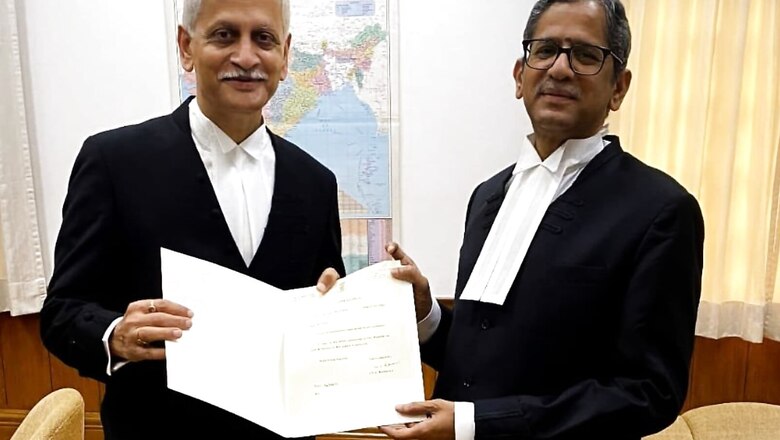Justice U U Lalit to Be New CJI: From Mumbai’s GLC to Landmark Kerala Temple, Triple Talaq Judgments

views
Appointed as the 49th Chief Justice of India, seniormost judge of the Supreme Court Justice Uday Umesh Lalit studied at the Government Law College in Mumbai and specialised in criminal law.
He has been part of several landmark judgments, including the one which held the practice of divorce through instant ‘triple talaq’ among Muslims illegal and unconstitutional.
He will succeed incumbent CJI NV Ramana. He will take the oath of office on August 27 and will retire on November 8. His tenure as the CJI will last only 74 days.
He will be the second CJI who was directly elevated to the apex court Bench from the Bar. Justice S M Sikri, who became the 13th CJI in January 1971, was the first lawyer to be elevated directly to the top court bench in March 1964.
A look at his career graph:
- BOMBAY HC: Born on November 9, 1957, Justice Lalit enrolled as an advocate in June 1983 and practised in the Bombay High Court till December 1985. His father UR Lalit was a senior advocate and served as a judge.
- SHIFTED TO DELHI: He shifted his practice to Delhi in January 1986. From 1986 to 1992, he worked with former Attorney-General Soli Sorabjee.
- HIGH-PROFILE CASES: In April 2004, he was designated as a senior advocate by the apex court. He was appointed a special public prosecutor for the CBI to conduct trial in the 2G spectrum allocation case.He also appeared in several high-profile cases, including the black buck case against actor Salman Khan, the road rage case against cricketer-turned politician Navjot Singh Sidhu and a corruption case on behalf of former Punjab Chief Minister Amarinder Singh.He was appointed as a judge of the Supreme Court on August 13, 2014.
- TRIPLE TALAQ: One of the path-breaking verdicts was the August 2017 judgment by a five-judge constitution bench which by a 3-2 majority ruled the practice of divorce through instant ‘triple talaq’ as “void”, “illegal” and “unconstitutional”. While then Chief Justice J S Khehar and Justice S Abdul Nazeer were in favour of putting on hold the judgment for six months and asking the government to come out with a law to that effect, Justices Kurian Joseph, R F Nariman and U U Lalit held the practise as violative of the Constitution. Justices Khehar, Joseph and Nariman have since retired.
- PADMANABHASWAMY TEMPLE: In another important judgment, a bench headed by Justice Lalit had ruled the erstwhile royal family of Travancore has the management right over the historic Sree Padmanabhaswamy Temple in Kerala, one of the richest shrines, holding that the rule of “heritability must get attached to a right of Shebait” (servitor) of the temple. The bench had allowed the appeal of the legal heirs of Uthradam Thirunal Marthanda Varma, the younger brother of the last ruler, Sree Chithira Thirunal Balarama Varma, setting aside the Kerala High Court’s 2011 verdict which directed the state government to set up a trust to take control of the management and assets of the temple.
- SEXUAL ASSAULT: A bench headed by Justice U U Lalit had ruled that touching sexual parts of a child’s body or any act involving physical contact with ‘sexual intent’ amounts to ‘sexual assault’ under section 7 of the Protection of Children from Sexual Offences (POCSO) Act. He held the most important ingredient is sexual intent and not skin-to-skin contact. Quashing the controversial ‘skin-to-skin’ judgments of the Bombay High Court in two cases under the POCSO Act, the bench had said the high court erred in holding that there was no offence since there was no direct ‘skin-to-skin’ contact with sexual intent.The high court had held that no offence of sexual assault under the POCSO Act was made out if there was no direct skin-to-skin contact between an accused and victim.
- AYODHYA CASE: In 2019, he was made part of the bench to hear the Ayodhya title suit issue. He recused himself after it was pointed out that he had appeared in a connected matter in 1997 as a lawyer for former Uttar Pradesh Chief Minister Kalyan Singh.
- NALSA: Justice Lalit also played an important role as the Executive Chairman of the National Legal Services Authority (NALSA). On a visit to Mumbai earlier this year, he had visited a school run by an NGO working for children of women from the red-light areas.
With Agency Inputs
Read the Latest News and Breaking News here




















Comments
0 comment